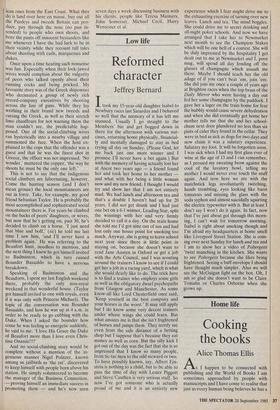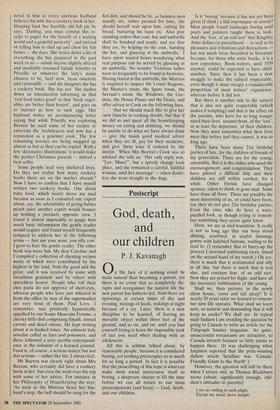Home life
Cooking the books
Alice Thomas Ellis
As I happen to be connected with publishing and the World of Books I am sometimes approached by people with manuscripts and I have come to realise that just as every human being believes he has a
novel in him so every uxorious husband believes his wife has a cookery book in her. Slurping back her horrible old fish pie he says, 'Darling, you must commit this re- ceipt to paper for the benefit of a waiting world and a grateful posterity', and instead of telling him to shut up and chew his fish bones—she does. She writes down a list of everything she has prepared in the past week or so — salade nigoise slightly altered and insolently renamed Salade Jennifer or Priscilla or whatever the lady's name chances to be, beef stew, bean omelette and ratatouille — and she imagines she has a cookery book. She has not. She dashes down an introduction informing us that 'real food tastes good' or that 'fresh veget- ables are better than frozen', and goes on to instruct us how to suck eggs. Her husband writes an accompanying letter saying that while Priscilla was exploring Borneo he used some of her recipes to entertain the Archdeacon and now has a reputation as a gourmet cook. The few remaining xeroxes are being snapped up almost as fast as they can be copied. With a few 'decorative illustrations' it would make the perfect Christmas present — indeed a best-seller.
Some people lead very sheltered lives. Do they not realise how many cookery books there are on the market already? Now I have to confess that I have myself written two cookery books. One about baby food, which nearly drove me mad because as soon as I consulted one expert about, say, the advisability of giving babies peach juice another expert would bounce up holding a precisely opposite view. I found it almost impossible to gauge how much basic information the gentle reader would require and found myself frequently tempted to address her in the following terms — Just use your nous, you silly cow. I grew to hate the gentle reader. The other book was more fun. My dear Caroline and I compiled a collection of cheating recipes many of which were contributed by the highest in the land, both the good and the great, and it was received by some with breathless gratitude and by others with speechless horror. People who roll their own pasta do not approve of short-cuts, whereas people who have just whizzed in from the office by way of the supermarket are very fond of them. Paul Levy, I remember, was positively hypnotically appalled by our Soupe Mauvaise Femme, a cheeky little dish comprising Smash, tinned carrots and dried onions. He kept writing about it in hushed tones. An eminent lady novelist called us liars and poisoners, and there followed a very acerbic correspond- ence in the columns of a learned journal. Food is, of course, a serious matter but not that serious— rather like life, I always feel.
Mr Beeton was clearly right about Mrs Beeton, who certainly did have a cookery book in her, but even she went over the top with some of her advice. For instance in her Philosophy of Housekeeping she says: 'As soon as the Mistress hears her hus- band's step, the bell should be rung for the
hot dish; and should he be, as business men usually are, rather pressed for time, she should herself wait upon him, cutting his bread, buttering his toast etc. Also give standing orders that coat, hat and umbrella shall be brushed and ready; and see that they are, by helping on the coat, handing the hat, and glancing at the umbrella.' I have spent wasted hours wondering what real purpose can be served by glancing at an umbrella. No wonder Victorian ladies were so frequently to be found in hysterics. Having stared at the umbrella, the Mistress is required to inspect the Lower Regions, the Master's room, the Spare room, the Servant's room, the Windows, the Gar- dens, the House Plants and the Drain, and offer advice to Cook on the following lines,
. . that we should much like to give her carte blanche in cooking details, but that if we did so and spent all the housekeeping money on eating and drinking, we should be unable to do what we have always done — give the maids good medical advice when they are ill, pay for their medicine, and give them wine if ordered by the doctor.' When Mrs Beeton's Cook was so advised she tells us: 'Her only reply was, "Lor, Mum!", but a speedy change took place, and she remained a careful, faithful woman, until her marriage' — when doubt- less she went straight to the dogs.















































 Previous page
Previous page